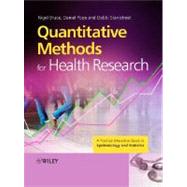
Note: Supplemental materials are not guaranteed with Rental or Used book purchases.
Purchase Benefits
Looking to rent a book? Rent Quantitative Methods for Health Research A Practical Interactive Guide to Epidemiology and Statistics [ISBN: 9780470022740] for the semester, quarter, and short term or search our site for other textbooks by Bruce, Nigel; Pope, Daniel; Stanistreet, Debbi. Renting a textbook can save you up to 90% from the cost of buying.
Nigel Bruce, PhD is Emeritus Professor of Public Health at the Department of Public Health and Policy, University of Liverpool, UK.
Daniel Pope, PhD is Senior Lecturer in Epidemiology and Public Health at the Department of Public Health and Policy, University of Liverpool, UK.
Debbi Stanistreet, PhD is Senior Lecturer and Faculty Director of Widening Participation at the Department of Public Health and Policy, University of Liverpool, UK.
| Preface | |
| Acknowledgements | |
| Philosophy of science and introduction to epidemiology | |
| Introduction and learning objectives | |
| Approaches to scientific research | |
| Formulating a research question | |
| Rates: incidence and prevalence | |
| Concepts of prevention | |
| Answers to self-assessment exercises | |
| Routine data sources and descriptive epidemiology | |
| Introduction and learning objectives | |
| Routine collection of health information | |
| Descriptive epidemiology | |
| Information on the environment | |
| Displaying, describing and presenting data | |
| Summary of routinely available data | |
| Descriptive epidemiology in action | |
| Overview of epidemiological study designs | |
| Answers to self-assessment exercises | |
| Standardisation | |
| Introduction and learning objectives | |
| Health inequalities in Merseyside | |
| Indirect standardisation: calculation of the standardised mortality ratio (SMR) | |
| Direct standardisation | |
| Standardisation for factors other than age | |
| Answers to self-assessment exercises | |
| Surveys | |
| Introduction and learning objectives | |
| Purpose and context | |
| Sampling methods | |
| The sampling frame | |
| Sampling error, confidence intervals and sample size | |
| Response | |
| Measurement | |
| Data types and presentation | |
| Answers to self-assessment exercises | |
| Cohort studies | |
| Introduction and learning objectives | |
| Why do a cohort study? | |
| Obtaining the sample | |
| Measurement | |
| Follow-up | |
| Basic presentation and analysis of results | |
| How large should a cohort study be? | |
| Confounding | |
| Simple linear regression | |
| Introduction to multiple linear regression | |
| Answers to self-assessment exercises | |
| Case-control studies | |
| Introduction and learning objectives | |
| Why do a case-control study? | |
| Key elements of study design | |
| Basic unmatched and matched analysis | |
| Sample size for a case-control study | |
| Confounding and logistic regression | |
| Answers to self-assessment exercises | |
| Intervention studies | |
| Introduction and learning objectives | |
| Why do an intervention study? | |
| Key elements of intervention study design | |
| The analysis of intervention studies | |
| Testing more complex interventions | |
| How big should the trial be? | |
| Further aspects of intervention study design and analysis | |
| Answers to self-assessment exercises | |
| Life tables, survival analysis and Cox regression | |
| Introduction and learning objectives | |
| Survival analysis | |
| Cox regression | |
| Current life tables | |
| Answers to self-assessment exercises | |
| Systematic reviews and meta analysis | |
| Introduction and learning objectives | |
| The why and how of systematic reviews | |
| The methodology of meta-analysis | |
| Systematic reviews and meta-analyses of observational studies | |
| The Cochrane Collaboration | |
| Answers to self-assessment exercises | |
| Prevention strategies and evaluation of screening | |
| Introduction and learning objectives | |
| Concepts of risk | |
| Strategies of prevention | |
| Evaluation of screening programmes | |
| Cohort and period effects | |
| Answers to self-assessment exercises | |
| Probability distributions, hypothesis testing and Bayesian methods | |
| Introduction and learning objectives | |
| Probability distributions | |
| Data that do not 'fit' a probability distri | |
| Table of Contents provided by Publisher. All Rights Reserved. |
The New copy of this book will include any supplemental materials advertised. Please check the title of the book to determine if it should include any access cards, study guides, lab manuals, CDs, etc.
The Used, Rental and eBook copies of this book are not guaranteed to include any supplemental materials. Typically, only the book itself is included. This is true even if the title states it includes any access cards, study guides, lab manuals, CDs, etc.